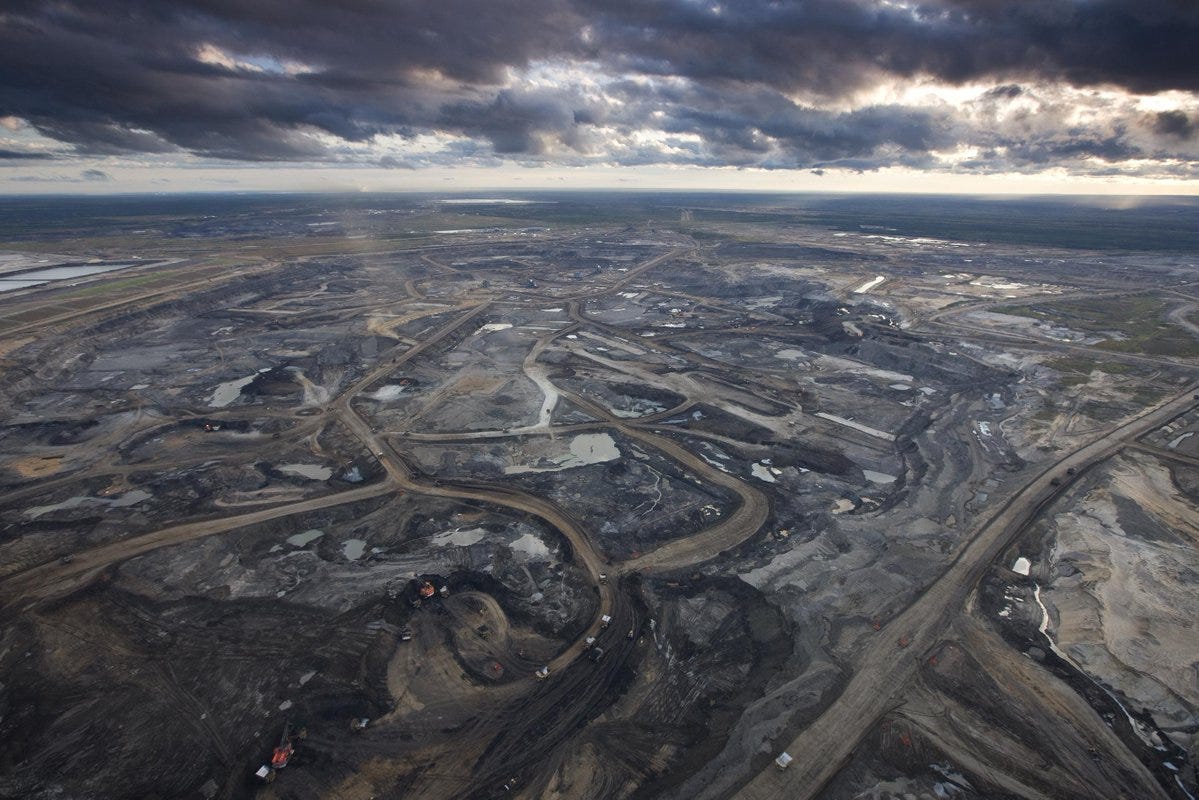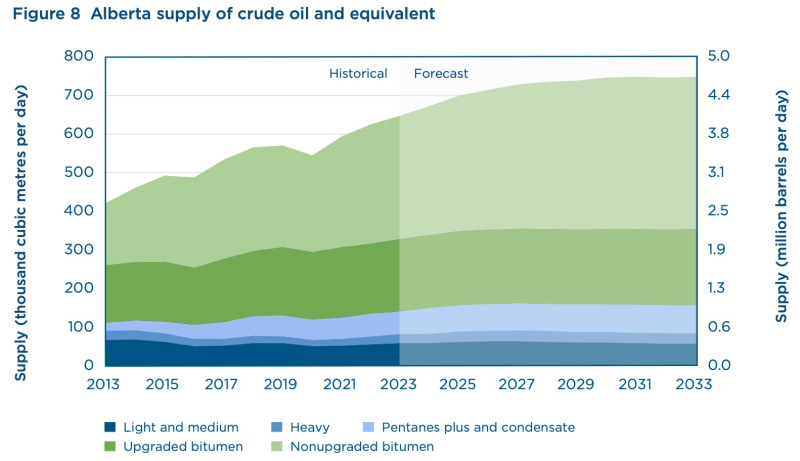A profoundly terrible idea: The Premier of Alberta wants to DOUBLE oil and gas production by 2050
Bad for economic security, bad for the environment, catastrophic for the climate
Earlier this year the Premier of Alberta tweeted: “I believe Alberta technology and innovation will allow us to double our oil and gas production AND become carbon neutral by 2050.” This last weekend at the Alberta United Conservative Party's Annual General Meeting she doubled down on this plan, except she was much less vocal about the carbon neutral part.
Let’s be clear: Doubling Alberta’s Oil and Gas output would be *catastrophic* for the climate. It would also be a disaster for Alberta's environment, and leave its economy deeply vulnerable to volatile and shifting global commodity markets.
In 2022, Alberta produced a record 217 million cubic meters of oil, the vast majority of which was from the oil sands. That works out to about 3.7 million barrels per day (mbpd), which is about two thirds of Canada’s total output. Doubling oil production over the next 27 years is equivalent to more than quadrupling what the province produced at the beginning of this Century. It’s like relaunching the entire history of oil production in Alberta all over again and adding it on top of what’s already there.
And as I’m sure you know, Alberta already has a deeply disturbing environmental impact from oil production - not only is production drawing upon precious water resources, generating enormous amounts of air and water pollutants, fragmenting ecosystems and migratory routes for birds and caribou, and permanently damaging the traditional territories of the province's Indigenous Peoples - it's also generating enormous amounts of GHGs in the production of oil. Of course, that produced oil then goes on to be consumed, further emitting even more GHGs into the atmosphere.
And that's just oil. She wants to double natural gas too! Natural Gas production volumes in Alberta are lower today than 15 years ago. As the figure below shows, production largely peaked in the early 2000s and has declined quite a bit since then. So doubling in this particular case means a resurgence and flip in the general production trend, seeking a new era of fossil fuel dominance when clearly the market signals have been pushing Alberta in the opposite direction for two decades.
As with oil, natural gas production comes with its own cumulative environmental impacts. Gas well infrastructures have required cut lines in order to sustain a network of seismic lines, roads, and gas lines visible from space and deeply disruptive to migratory species - especially caribou. And let’s not forget that natural gas infrastructure is prone to leakage, which is a major contributor to global warming due to Methane’s very strong warming potential.
Canada's Oil and Gas sector is the largest emitting sector (accounting for 31% of Canada's total GHG emissions). And Alberta accounts for the largest share of that. Again, earlier this year the Premier claimed she "believed" the province could double oil and gas production AND reach Net Zero by 2050... but that is nothing but a fairy tale. In fact, she herself revealed the implausibility of carbon neutral oil and gas production yesterday, in her reaction to the Federal government’s announced GHG emissions Cap. It turns out the Federal government wants to reach Net Zero emissions in the oil and gas sector by 2050 too, but this time around Premier Smith seems to think it will kneecap the province’s economy - very likely because this time the idea came from her political opponents - Justin Trudeau and Steven Guilbeault.
GHG emissions from Alberta's Oil and Gas sector have grown alongside production emissions for decades. It would already be a near impossible task just to maintain production levels and implement enough Carbon and Storage capacity to bring emissions from production down to zero in the next 25 years. To propose to then DOUBLE production while doing so is a complete fantasy.
The good news is that global markets seem poised to put a damper on any proposed doubling of oil. In fact, no one seems to think the Premier’s words have much weight to them. The banks that finance production are well aware of forthcoming demand shifts. Even the Government of Alberta’s Energy Regulator itself expects daily production of gas to flatten out over the next decade, and oil production to level out by end of this decade.
But whether or not the Premier’s plan to double oil and gas production is economically viable is not the point. The point is: a) a responsible government would be attuned and responding carefully to global market shifts and recognize the vulnerabilities it poses to Alberta’s economy to double down (literally) on fossil fuels; b) a responsible government would put resources into envisioning a sustainable future and leveraging existing assets to modernize its (higher value) exports, not expand upon dirty lower value raw commodities; and c) a responsible government would focus on cleaning up the cumulative environmental damages that have accrued over the last half Century of expanding oil production, not trying to make that task *twice as difficult*!
Sadly, the current government in Alberta seems completely unconcerned with addressing these challenges. At the same meeting where Smith reiterated this proposal, the Party not only voted in favour of abandoning Alberta's GHG reduction targets, it also adopted one of the most classic tropes of the Climate Denial movement - a resolution recognizing carbon dioxide is “a foundational nutrient for all life on earth.”
Perhaps one of the saddest things about this proposal is just how much Alberta itself has to lose from climate change. Just three months ago, the town of Jasper was partly lost to a wildfire, and the Premier was moved to tears - and experts noted that this was driven by hot and dry weather associated with the burning of fossil fuels, a fact she seems to refuse to acknowledge. The costliest insurance event in Canada's history was another wildfire event - the Fort McMurray wildfire, described in the prize-winning book by John Vaillant, Fire Weather, as another disaster made more likely by climate change. This spring Alberta was ravaged by extreme drought, and residents in some towns were forced to curtail water use. A hail storm in Calgary in August was amongst the costliest insurance events in Canada so far this year. The risks of climate breakdown to Alberta’s economy and its people are ever-present, which makes this proposal even harder to understand.
In global terms, last year was the hottest year in at least the last 125,000 years, likely longer. This year is expected to be even hotter. The Earth is careening towards catastrophic tipping points, which will bring untold suffering and misery not only to the world's most vulnerable, but even to those lucky enough to call the stunningly beautiful province of Alberta home. The latest IPCC report clearly states that no new fossil fuel projects can be initiated if we want to have a hope in hell of keeping global warming to under 2°C. The Premier needs to stop playing games and put the province's future first.











Look…please get the facts straight..
The Alberta contribution to global GHG (even if it was important to care about) is a few % at most.
Also… by shipping out Natural gas we may displace coal which would be a Net improvement.
Oil demand will go up not down as the alternatives just dont work.
Then we need to realize that GHG (CO2) per IPCC is not doing much to change the climate and so far at climate time frames its not an impact metric of concern.
So NetZero is unnecessary, technologically unattainable, economically unviable and extremely foolish.
The climate predictions look scary but the actuals are not.